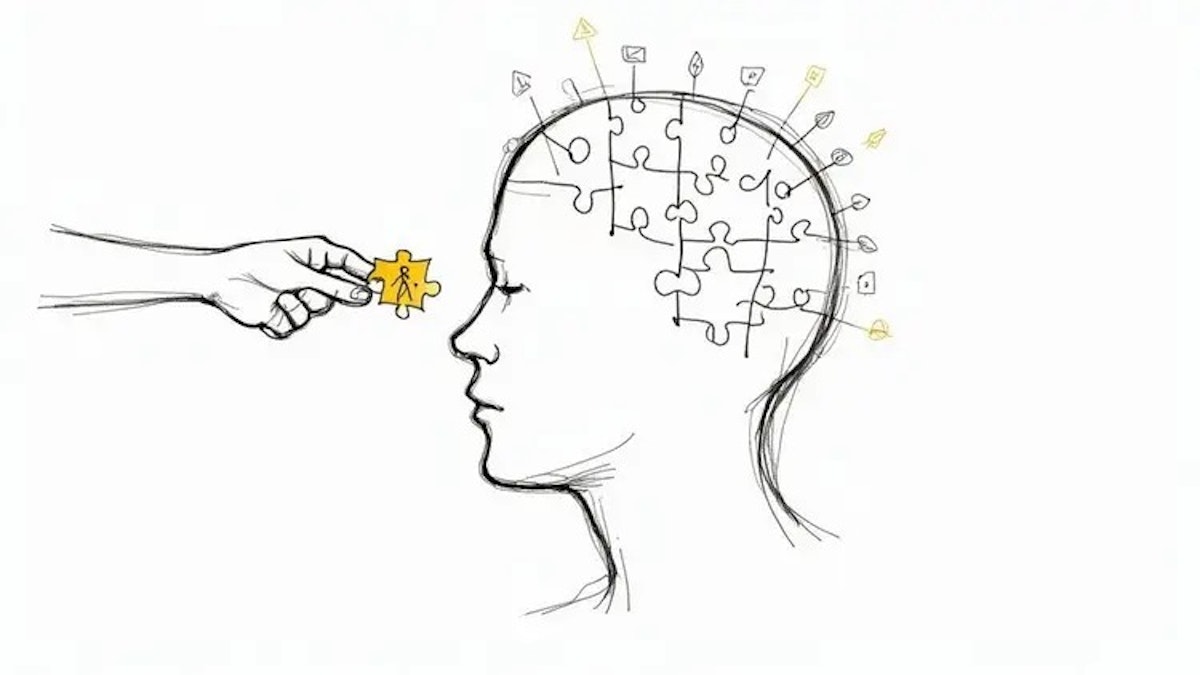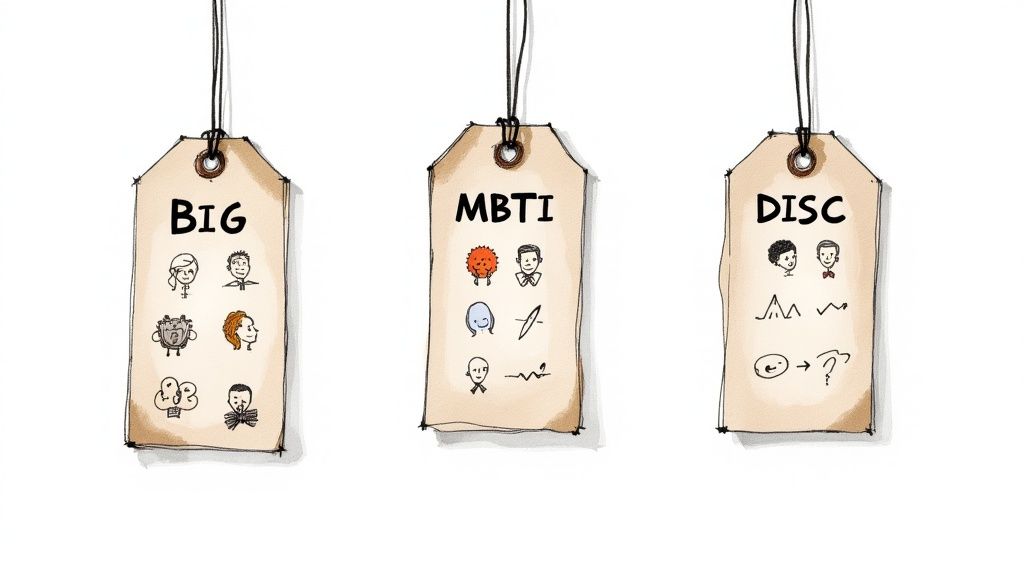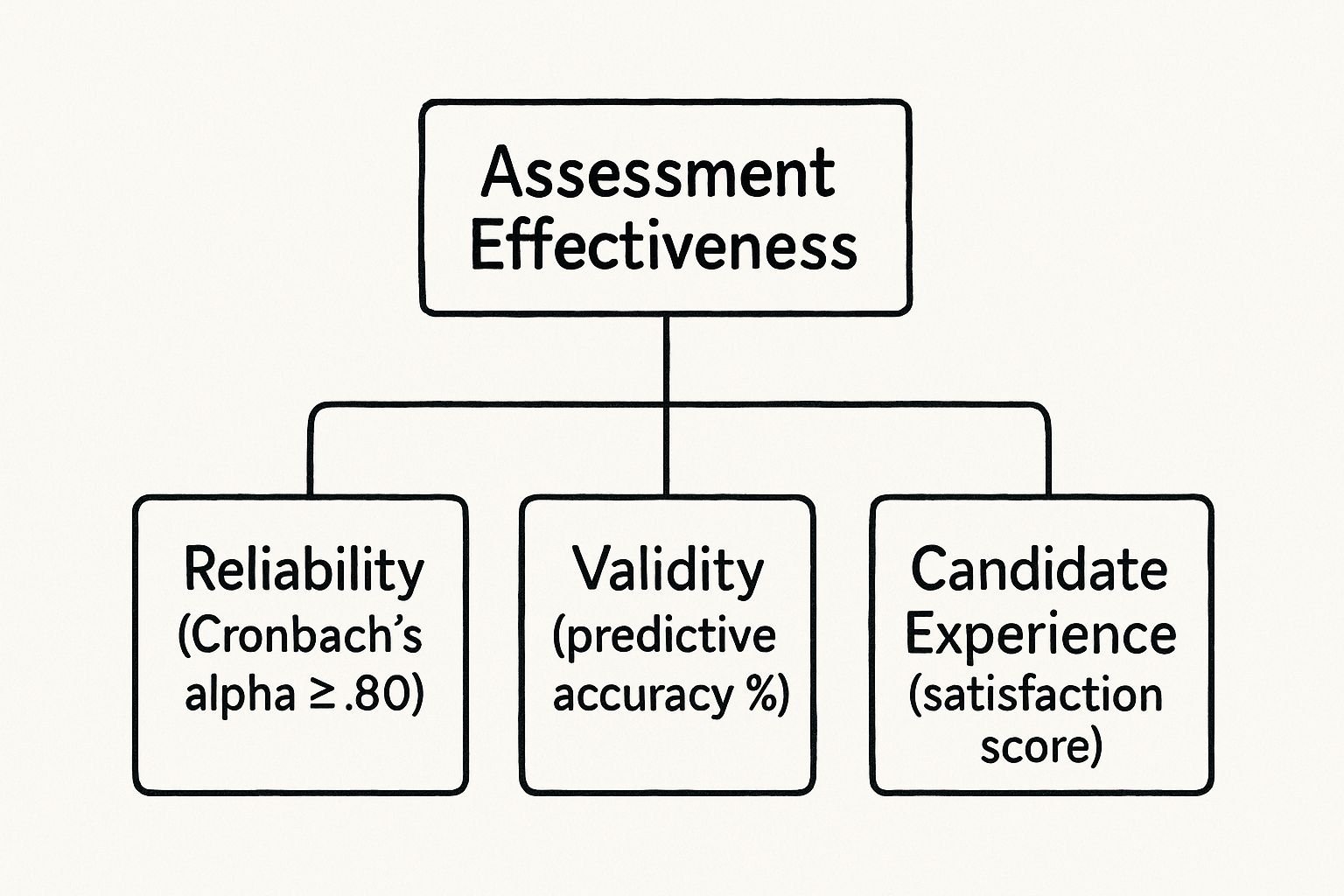A Guide to Personality Assessment for Hiring

At its core, a personality assessment for hiring is a tool that helps you look past a candidate's resume and get a real sense of their natural behaviors, driving motivations, and preferred work style. It's less about what they've done and more about how they do it, giving you a clearer picture of how they might fit into a specific role and your company's unique culture.
The Growing Role of Personality Assessments in Modern Recruitment

The hiring game has changed. It’s no longer just about checking boxes for skills and experience. In today's talent market, we've learned a crucial lesson: a candidate's underlying personality is one of the strongest predictors of whether they'll succeed in the long run. This simple truth is causing a huge shift in how companies approach building their teams.
This is where personality assessments come in. What was once seen as a niche tool is now a go-to strategy for forward-thinking Human Resources departments. Why? Because they offer objective data on the things a resume can’t tell you—soft skills, cultural alignment, and a person's potential to grow with your company.
A Strategic Shift from Skills to Traits
Think of it like this: a resume lists the parts of an engine—the qualifications, the past jobs, the technical skills. A personality assessment, on the other hand, shows you how that engine actually runs, especially under pressure. It reveals the candidate's unique "operating system."
A personality test for hiring isn't about judging someone as "good" or "bad." Its real purpose is to see if a candidate's natural tendencies and behaviors are a good match for the specific demands of a job and the core values of your company.
This isn’t just a fleeting trend; it’s a movement backed by serious numbers. The global market for these assessments has exploded, which tells you just how valuable companies are finding them. According to a market report from The Business Research Company, this growth reflects a wider adoption of data-driven hiring strategies.
- The personality assessment market hit a value of roughly USD 8.75 billion in 2023.
- This came from a strong compound annual growth rate (CAGR) of 11.2% between 2019 and 2023, as more and more businesses integrated these tools to make better hires.
Building Resilient and Cohesive Teams
Ultimately, using a personality assessment is about building a workforce that’s stronger and more adaptable. When you understand a candidate's core traits, you can make much better predictions about how they’ll collaborate, communicate, and handle problems. This kind of insight is the key to cutting down on costly employee turnover and creating a workplace where people don't just show up—they thrive.
Why Personality Matters More Than Ever in Hiring

A polished resume tells you what a candidate has done. It’s a great starting point, showing you their skills and past projects. But it doesn't tell you the whole story.
A personality assessment for hiring peels back the layers to reveal the how. How they solve problems. How they communicate. How they’ll react when things get tough. It gets to the core of who they are as a professional.
Think of it like this: a resume is a list of a computer’s specs and installed programs. A personality test is a diagnostic of its operating system. You can have the most powerful software in the world, but it won’t do much good on an incompatible OS. The same is true for a brilliant employee whose work style fundamentally clashes with their role or team.
This deeper insight isn’t just a "nice-to-have" anymore. In a world where business priorities can shift in an instant, hiring for traits like adaptability and resilience isn't just smart—it's essential for survival.
Beyond the Resume to Real Business Outcomes
Using personality assessments isn't about getting a warm, fuzzy feeling about a new hire. It's about making better decisions that produce measurable results. When you start looking beyond the bullet points on a resume, you begin to see how individual traits directly impact your bottom line.
The proof is in the evidence. Companies that integrate these tools into their hiring process report real, tangible improvements. It turns a screening step into a powerful driver of business success.
A well-designed personality assessment gives you objective data to help predict how a candidate will actually behave on the job. This lets hiring managers move past gut feelings and make evidence-based decisions that lead to better outcomes for everyone involved.
The key benefits are hard to ignore:
- Reduced Hiring Mistakes: Assessments flag potential mismatches before you make an offer, dramatically lowering the risk of a costly bad hire.
- Improved Team Dynamics: Understanding how a new person will mesh with your existing team helps you build more cohesive and collaborative units from day one.
- Higher Employee Engagement: When someone’s personality aligns with the demands of their job, they feel more energized and satisfied. That naturally leads to better engagement and higher productivity.
Uncovering What Really Drives People
A good personality assessment digs into the foundational traits that dictate how people show up to work every day. It answers the critical questions that a standard interview often can't quite get to.
For instance, is this candidate motivated by collaboration, or do they do their best work alone? Do they thrive with structure and clear processes, or do they need the freedom to experiment?
Knowing this is everything. A top performer who excelled in a chaotic startup might feel completely stifled in a highly regulated corporate culture, no matter how skilled they are. These assessments give you the insight to place people in environments where they can truly shine. This is a huge part of building a strong company, and you can learn more about measuring culture fit for successful employee selection in our detailed guide.
Building a More Resilient and Adaptable Workforce
Today’s workplace requires more than just technical know-how; it demands mental fortitude. A personality assessment is one of the best tools for identifying candidates who have the core traits needed to navigate change and bounce back from setbacks.
It helps you understand things like:
- Problem-Solving Approach: Does the candidate tackle challenges with creativity, or are they more analytical and risk-averse?
- Communication Style: Are they direct and assertive, or more diplomatic and consensus-driven when giving and receiving feedback?
- Resilience: How do they handle pressure? Can they recover from a failure and keep moving forward?
These aren't just personality quirks; they are the bedrock of an agile and future-proof organization. By using personality assessments, you're not just filling a role. You're strategically building a team that's equipped to handle whatever the future throws at it.
Navigating the Different Types of Personality Assessments
Choosing the right personality assessment for hiring can feel like picking a tool from a giant, overflowing toolbox. You have dozens of options, but only a few are right for the specific job you're trying to do. To make a smart choice, you need to look past the brand names and really understand what each type of assessment measures and, more importantly, where it shines. The goal isn't just to check a box; it's to gather meaningful insights for a particular role.
A great assessment boils down to a few key things: it needs to be reliable, valid, and offer a positive candidate experience.

Think of it this way: a reliable test gives you consistent results, a valid one actually predicts on-the-job performance, and a good experience ensures you don’t alienate great candidates in the process.
The Big Five (OCEAN Model)
Many experts consider the Big Five the gold standard in personality science, and for good reason. It’s built on decades of research and has a proven track record for predicting job success. It breaks down personality into five core dimensions, easily remembered with the acronym OCEAN.
- Openness: How curious and open is someone to new ideas? High scorers are often creative thinkers, while low scorers are more comfortable with routine.
- Conscientiousness: This is a big one. It's a powerful predictor of performance across almost any job, measuring traits like organization, discipline, and dependability.
- Extraversion: Where does someone get their energy? From being around others (extraverts) or from spending time alone (introverts)? This is critical for roles that are highly collaborative or customer-facing.
- Agreeableness: This looks at traits like empathy, cooperation, and compassion. It’s a must-have for strong teamwork and excellent customer service.
- Neuroticism: Also known as Emotional Stability, this gauges how someone handles stress. Low neuroticism (or high stability) is a fantastic indicator of resilience and poise under pressure.
Because it’s so thorough and well-validated, the Big Five gives you a detailed, job-relevant picture of a candidate, making it a fantastic all-around choice.
DISC Assessment
The DISC model is less about the deep, underlying personality traits and more focused on observable behavior and communication styles. It’s a practical tool that sorts people into four primary styles, which is incredibly helpful for figuring out how a new hire will mesh with your existing team.
- Dominance (D): Direct, decisive, and results-oriented.
- Influence (I): Enthusiastic, persuasive, and relationship-focused.
- Steadiness (S): Calm, dependable, and supportive.
- Conscientiousness (C): Analytical, precise, and quality-driven.
DISC is especially powerful for roles in sales, management, and any highly collaborative environment where smooth communication is the key to success.
Myers-Briggs Type Indicator (MBTI)
The MBTI is probably the most famous personality framework out there, sorting people into one of 16 personality types. It’s a fantastic tool for self-awareness and can help teams understand each other better.
But a word of caution: it has its limits in a hiring context. Many psychologists advise against using it for selection because its results aren't always consistent over time, and it doesn't have the same predictive validity for job performance that models like the Big Five offer.
The MBTI is best used as a developmental tool for existing teams, not as a crystal ball for hiring. It helps people appreciate their differences but doesn't reliably tell you who will succeed in a specific role.
Comparison of Common Personality Assessment Models
To help you decide, here’s a quick comparison of these popular models. Each framework offers a different lens through which to view a candidate, so matching the tool to your objective is crucial.
| Assessment Model | Primary Focus | Best Used For | Key Consideration |
|---|---|---|---|
| Big Five (OCEAN) | Core, stable personality traits with strong scientific validation. | Predicting job performance across a wide variety of roles. | Provides a deep, comprehensive profile but can be more complex to interpret. |
| DISC Assessment | Observable behaviors and communication preferences. | Improving team dynamics, sales effectiveness, and leadership. | Focuses more on how people act, not who they are at their core. |
| Myers-Briggs (MBTI) | Personal preferences and how individuals perceive the world. | Team-building, personal development, and conflict resolution. | Not recommended for hiring due to lower predictive validity. |
Ultimately, the best assessment is the one that gives you the specific insights you need for a particular position and your company's environment.
Choosing the Right Assessment for Your Needs
There's no single "best" test for every situation. The right choice depends entirely on what you’re trying to accomplish. You have to align the assessment with the specific demands of the job and your company culture. To get a clear idea of what you’re hiring for, it's often smart to start with a full organizational culture assessment.
Once you know the profile you're looking for, you can explore different cultural fit assessment tools to find candidates who align with your core values. This is especially important for building cohesive teams where shared behaviors are just as vital as technical skills. When you're this intentional with your choice, an assessment becomes more than just a test—it becomes a strategic advantage.
How Technology Is Revolutionizing Personality Assessments

The days of tedious, paper-based personality questionnaires are quickly becoming a memory. Technology, especially artificial intelligence and sophisticated data analytics, is completely changing the game for how we assess candidates. We're moving far beyond simple self-report surveys into a new era of dynamic, insightful, and frankly, more enjoyable experiences for everyone involved.
This shift isn't just about bells and whistles. As companies hunt for top talent in a global, often remote, workforce, they desperately need ways to understand candidates that are both scalable and objective. Technology is closing that gap, delivering deeper insights while making the entire hiring process more efficient and fair.
From Questionnaires to Engaging Experiences
One of the biggest leaps forward is the move away from the classic multiple-choice format. The best platforms today are weaving in evaluation methods that feel much more interactive and true-to-life.
Two innovations really shine here:
- Gamification: Instead of ticking boxes, a candidate might find themselves solving a puzzle or navigating a challenge within a game. These activities cleverly measure traits like problem-solving, risk tolerance, and attention to detail based on what a person does, not just what they say they'd do.
- Situational Judgment Tests (SJTs): These aren't new, but technology has supercharged them. Candidates are presented with realistic workplace scenarios, often through interactive videos or simulations, and asked how they would respond. It gives you a much richer picture of their practical skills and on-the-spot decision-making.
The result? Candidates are more engaged and far less guarded, which means the data you get is much more authentic.
AI and the Promise of Objective Evaluation
Let's be honest: unconscious bias is one of the toughest hurdles in recruiting. Even with the best of intentions, we can all be swayed by factors that have nothing to do with a candidate's ability to succeed. This is where AI is making a real difference, by zeroing in on objective data.
By analyzing behavioral patterns and response data—without any knowledge of a candidate’s background—AI helps create a more level playing field. It forces the focus away from subjective first impressions and onto measurable, job-relevant traits. That's the foundation of truly fair and effective hiring.
This data-first approach is delivering real results. As reported by SHRM, the move to digital recruiting is widespread, with about 78% of organizations now using technology in their hiring processes. And when it comes to performance, research from Aberdeen Group has shown tech-powered assessments can predict on-the-job success with up to 30% greater accuracy than old-school methods.
The Power of Predictive Analytics
Technology isn't just identifying traits; it's enabling predictive analytics. This is where a personality assessment for hiring evolves from a simple snapshot into a powerful forecasting tool. You start by analyzing the assessment data from your current top performers to build a "success profile" for a given role.
When new candidates take the assessment, their results are benchmarked against this profile to predict their likelihood of not only succeeding but also staying with the company long-term. In fact, a study published in the Journal of Applied Psychology found that employees whose personalities were a good fit for their jobs were not only more satisfied and committed but also less likely to leave, directly impacting retention.
This predictive capability changes everything. It helps companies shift from reactive hiring (just filling an empty seat) to proactive team-building, where every new hire is chosen for their potential to drive long-term success. If you're ready to dig deeper, check out our guide on how AI hiring is transforming recruitment with intelligent assessment.
The evolution of modern employee selection platforms shows just how integrated technology has become. These advanced systems are putting powerful tools within reach for businesses of all sizes, ensuring even smaller companies can build cohesive, high-performing teams in a competitive world.
Putting Personality Assessments to Work: A Fair and Effective Strategy
Rolling out a personality assessment isn't as simple as picking a test and hitting "send." The difference between gathering genuinely useful data and creating a process that feels unfair—or worse, legally risky—comes down to having a thoughtful strategy. Think of it like building a bridge: you need a solid foundation, careful assembly, and clear signposts for everyone involved.
The entire process hangs on one fundamental idea: the assessment must be directly tied to what the job actually requires. Without that link, you're not just collecting random information; you're inviting bias and potential legal headaches. Every single step, from picking a test to reading the results, has to support the goal of finding the best person for that specific role.
Start With Your “Success Profile”
Before you even look at a single assessment tool, you need to define what success in the role looks like. This "success profile" is your North Star. It’s a detailed blueprint of the traits, behaviors, and skills that your top performers in a similar job consistently bring to the table.
To build a meaningful profile, ask concrete, job-related questions:
- What behaviors truly drive success here? Does this job demand constant collaboration, or is it more about deep, independent focus?
- Which soft skills are absolutely non-negotiable? Is resilience under pressure a must-have? Is a proactive communication style essential for keeping the team in sync?
- How does this role plug into the team and company culture? What kind of personality will complement the existing dynamic, not clash with it?
Answering these questions first makes your assessment a targeted tool instead of a generic questionnaire. It shifts the focus from a vague "What is this person like?" to a much more practical "Do this person's natural tendencies align with what this job demands?"
Keep It Fair and Legally Sound
Using assessments in hiring comes with serious legal and ethical responsibilities. To do this right, you have to prioritize objectivity and follow guidelines from bodies like the U.S. Equal Employment Opportunity Commission (EEOC).
A personality assessment is only defensible in a hiring context when it is validated and job-relevant. Validation means you have scientific proof the test measures what it says it does and can predict job performance. Job relevance means the traits you're measuring are directly linked to the actual duties of the role.
If you don't meet these standards, you could end up with discriminatory hiring practices, even if you didn't mean to. For example, if a test consistently screens out people from a specific demographic group, it could be deemed discriminatory if the traits being measured aren't essential for doing the job. To avoid this, it's smart to learn about reducing hiring bias with evidence-based AI tools and make sure your process is as objective as it can be.
See the Results as One Piece of a Bigger Puzzle
This is probably the most common mistake companies make: treating assessment results like a final "pass/fail" grade. A personality assessment is a single, powerful data point, but it's not the whole story. It’s one instrument in an orchestra, not a solo performance.
Here’s how to interpret results the right way:
- Use scores to guide conversations. The results should shape your interview questions, not replace them. If an assessment suggests a candidate might be less assertive, you can dig into that during the interview with situational questions to get more context.
- Train your hiring managers. Anyone who sees the results needs to be trained on how to read them correctly and without bias. They need to understand the report's nuances and see it as a tool for a deeper, more meaningful conversation.
- Combine all your insights. The real magic happens when you blend the assessment data with everything else you've learned from resumes, interviews, work samples, and reference checks. A holistic view is always a more accurate one.
Don’t Forget the Candidate Experience
Finally, how you talk about the assessment process matters. A lot. Candidates are far more likely to engage honestly with a process they understand and believe is fair.
Be transparent from the get-go. Explain why you're using a personality assessment, what it measures, and how the results fit into the overall decision. This simple act of transparency builds trust and shows you respect the candidate's time and effort. And if you can, offering to share a summary of their results is a fantastic way to provide real value and leave a positive, lasting impression of your company—no matter the outcome.
Navigating the Common Pitfalls of Personality Testing
Bringing personality assessments into your hiring process is a smart move, but it's not a silver bullet. Without the right approach, even the best tools can backfire, leading to frustration, bad hires, and even legal trouble. Knowing the common traps is the first step to avoiding them and making your assessments truly work for you.
One of the biggest mistakes we see is putting too much faith in the test score itself. It's easy to look at a report and want to make a simple "yes" or "no" decision based on the numbers. But that’s a huge oversimplification. A personality assessment is just one piece of a much larger puzzle.
Think of it as one powerful data point, not a crystal ball. When you ignore what you learn from interviews, reference checks, and hands-on work samples, you risk passing on a fantastic candidate who just doesn't test perfectly, or hiring someone who looks great on paper but can't deliver. The results are there to inform your decision, not dictate it.
Matching the Test to the Task
Another classic blunder is using the wrong tool for the job. You wouldn't bring a sledgehammer to hang a picture frame, right? The same logic applies here. Using a personality assessment designed for personal development—like the popular MBTI—for a high-stakes hiring decision is a serious mismatch.
These kinds of tools simply don't have the scientific backing to predict how someone will actually perform in a specific role. For hiring, you absolutely need an assessment that has been scientifically validated and proven to forecast success in a professional setting. Using the wrong one doesn't just give you unreliable information; it can open your company up to legal challenges if the test isn't directly relevant to the job.
The real value of any personality assessment comes from using it correctly. Even the most objective, data-driven tools can fail if they’re misinterpreted or used for a purpose they weren't built for. In the worst-case scenario, you can end up reintroducing the very biases you were trying to eliminate.
The Human Element in a Data-Driven World
Even with the right tools, our own unconscious biases can sneak back in when it's time to interpret the results. A hiring manager might have their own idea of what a "good" personality profile looks like for a role, and that can easily color their judgment, completely undermining the objectivity of the assessment.
This is where having a clear, consistent process becomes non-negotiable. While AI and data analytics have made these tools more powerful than ever—with the global market projected to hit USD 11.25 billion by 2025—their effectiveness still comes down to people. You can explore the market research on personality assessment solutions to get a sense of this incredible growth.
So, how do you steer clear of these pitfalls? Focus on these practical steps:
- Train your team. Make sure every single person involved in hiring knows exactly how to read and apply the assessment reports correctly and ethically.
- Use validated, job-relevant tools. Stick to assessments with proven scientific validity that measure traits directly linked to the core duties of the job.
- Create a clear policy. Set firm, consistent rules for how assessment data is used from the first screen to the final offer. This ensures fairness for everyone.
Got Questions About Personality Assessments? We've Got Answers.
It's only natural to have questions when you're thinking about adding a new tool to your hiring process. Let's tackle some of the most common ones we hear from HR pros and hiring managers.
Can a Candidate Really "Game" a Personality Test?
This is a big one. It's true that a savvy candidate might try to answer in a way they think you want to hear. But here’s the thing: professionally designed assessments have gotten pretty smart about this.
Many of the best tools have built-in consistency checks, almost like little tripwires. They can flag response patterns that just don't add up or look like someone is trying too hard to seem perfect. More importantly, tests grounded in solid science, like the Big Five model, aren't about right or wrong answers. They're about identifying core traits, and it’s surprisingly difficult to convincingly fake your fundamental personality.
Are We Opening Ourselves Up to Legal Trouble?
Any hiring tool carries some risk, but you can absolutely use personality assessments in a legally sound way. The two magic words here are validated and job-relevant. A validated test has the scientific proof to back up its claims—it actually measures what it says it measures. Job-relevance means you're only assessing traits that are genuinely essential for someone to succeed in that specific role.
It's all about fairness and equal opportunity. To stay on the right side of compliance, you must ensure the test doesn't create an "adverse impact" or unintentionally filter out candidates from protected groups. This is exactly why grabbing a free quiz off the internet is a terrible idea and sticking with professionally developed tools is non-negotiable.
How Should We Actually Use These Results?
Think of a personality assessment report as a conversation starter, not a final verdict. It should never be the single reason you hire or pass on a candidate. Instead, it’s a powerful piece of the puzzle.
Here’s how to put the results to work:
- Sharpen your interview questions. Did the report flag a potential for low conscientiousness? You can dig into that with behavioral questions about how they've managed deadlines or complex projects in the past.
- Predict team chemistry. The insights can give you a clue about how a candidate’s communication or work style might mesh with your existing team.
- Create a better onboarding plan. Knowing what motivates a new hire or where they might need extra support from day one helps managers tailor their approach and set that person up for success.
Treat the report as a guide for a deeper, more meaningful discussion. It’s one data point among many.
Ready to build more cohesive, high-performing teams with data-driven insights? MyCulture.ai offers a science-backed assessment platform to evaluate candidate alignment with your unique company values. Generate your first custom culture assessment today!